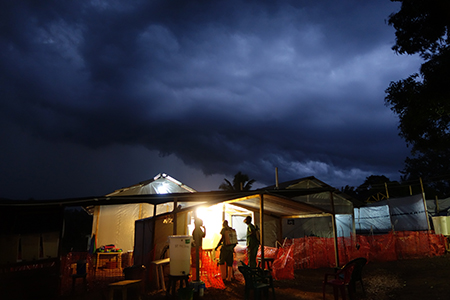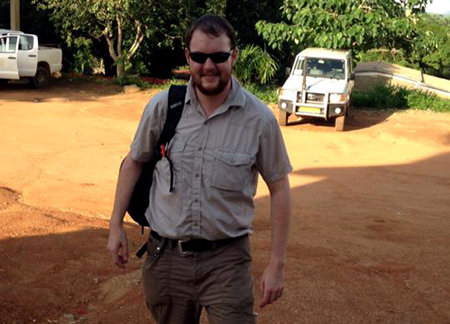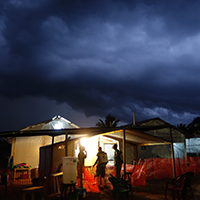 The European Mobile Laboratory in Guéckédou, Guinea; the initial epicentre of the outbreak
The European Mobile Laboratory in Guéckédou, Guinea; the initial epicentre of the outbreak
A University of Liverpool PhD candidate returned to the UK having spent July in West Africa, on the frontline of the battle to contain the Ebola virus.
Andrew Bosworth travelled to the epicentre of the outbreak in Guéckédou, Guinea with the World Health Organisation’s (WHO) Global Outbreak Alert Response Centre, to help set up a European Mobile Laboratory.
“We were working at the treatment centre; seeing patients being brought through and the burial teams heading off. It was all right there on the front doorstep.
“We just had to have faith that what we were doing, and all of the training and experience we had, was enough to protect us.”
Working alongside colleagues from across Europe, Andrew’s main role was to analyse the samples coming out of the treatment centre. He would chemically inactivate the samples to make them safe before testing them for Ebola, malaria and other infections.
 Now back in the UK, Andrew has been asked to return to Africa, to Sierra Leone, where demand is now greatest
Now back in the UK, Andrew has been asked to return to Africa, to Sierra Leone, where demand is now greatest
Andrew said that on departure, the situation in Guinea was much calmer, with an increase in negative results coming back from analysis and more patients presenting themselves earlier for testing. As he prepared to leave, the majority of samples – his lab would receive 10 to 15 a day – came from Liberia.
Currently working for Public Health England at Porton Down, ahead of starting his PhD in molecular virology, Andrew said: “It’s good to be part of a rotation system but I feel quite guilty that I’m back here now, drinking a decent cup of coffee, while there are teams still out there working.
“I feel a bit like I’ve left before the job is done.”
And although resting back in the UK now, the 25-year-old is hoping to return; this time to Sierra Leone as the outbreak shifts.
Andrew added: “It’s the first time I’ve had the opportunity to help out in an outbreak situation, and I was going to go and help regardless of the fact I’m doing a PhD in the subject.
“I have a major interest in Ebola and I think having this connection with the outbreak will be very useful. I’ve been able to see the impact and learn more about how it spreads, all of which has shown me the virus in new dimensions, and that will really help my PhD.”
Andrew will join the University’s Institute of Infection and Global Health in October. His PhD is entitled: Why do different strains of Ebola cause different pathogenicity and disease?
